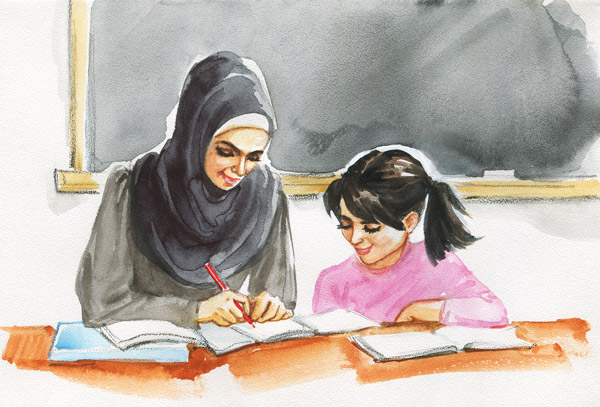31 January 2019

Blog
Title: “Back to school for teachers” – 7 Urban Myth Busters
Written by Dylan Chown – Centre for Islamic Thought and Education, UniSA
Sooner than imagined, we find ourselves at the beginning of a new school year. School is back in!
As we ride the wave of the new school year, we must quickly remind each other, as fellow educators, to beware of the urban myths.
The urban myths that can derail our practice – that can distance us from our Prophetic example, and that compromise the Islamic vision of education we aspire for our students.
By urban myths, I’m referring to perhaps familiar statements espoused in our staffrooms, in our hallways and even in our meetings that whilst untrue are often repeated.
You may have come across an urban myth or two in your time…
Some of the clangers include:
“Don’t let them see you smile until term 2”, “Get tough early”, “Let them know who’s boss”, “Take control”, “Read them the riot act, lay down the rules”, “Zero tolerance early on”, “First chance you get, make an example of someone”.
These urban myths are particularly harmful for early career teachers, though cancerous to all.
They project a deficit view of our students and impose dominance over dignity. They privilege power in our classrooms, in our practice. They prevent us from establishing and maintaining positive and genuine relationships with our students. They mean our example is devoid of the model of character that we aspire for our students. They promise only a transactional potential and forgo a transformative one.
Power, control, dominance, harshness and strictness are not the qualities or the characteristics of the best of all teachers – our Prophet (SAW). And the urban myths that peddle such anathemas should be challenged and avoided at all costs.
I offer 7 strategies or reminders that fly in the face of these urban myths, and yet facilitate a positive learning environment and experience for all.
Towards a learning environment that is sacred, disciplined and functional and in equal measure an experience that is joyous and fun.
7 Urban Myth Busters:
1. Smile
Remember, we bring the weather – let’s make our classrooms and our schools warm, inviting – human!
2. Establish relationships
Take time to get to know our students and their parents. Allow time for our students to either get to know one another or re-acquaint with one another. Relationships are one of the most critical dimensions of pedagogy.
3. Start afresh
Avoid profiling of students from past years or past teacher colleagues. Our students are not inmates, we must distinguish between what information or what data allows us to better meet needs and what data might prejudice our relationship or our perception of our students. Let us not shame our students for previous mistakes, lessons that may have been learned, taubah that may have been made and accepted.
4. Establish routines and share clear expectations
Routines set the rhythm and bring calmness and coherence to the day. Sharing clear expectations outline the steps to success and encourage our students to be active participants whilst also fostering a degree of independence.
5. Role model
Model good character, a positive attitude and the faith informed dispositions that we wish to foster in our students.
6. Go low and go high
When tensions arise, we go low (we lower our tone, we sit, we take a breath or take a sip). When others, even our students, go low, we look for the higher road.
7. Virtual school bags
Look for assets to learning beyond oneself – be prepared to learn from our students. Allow our students to bring what Pat Thomson refers to as their ‘virtual schools bags’ inside the classroom. Avail from our students’ funds of knowledge (recognising that our learners’ identities and their religious, cultural, and linguistic capital, including their ways of knowing are assets for our teaching and learning).
Let nothing come between the most special and most cherished lot of teachers and teaching – the face to face, the heart to heart with our students. The 7 Urban Myth Busters reconnect us with what most surely is the hallmark of our pedagogical roles – relationships premised on empathy and mercy.
For a faith-filled classroom characterised by justice, by the humanising of all identities, all voices is our mandate. And every soul in our care represents an individual trust, an individual amanah.
Experience teaches us teachers that our students care little of what we know until they know how much we care! Let this be a call to action, to call out these urban myths in favour of a positive learning environment and experience for all.




